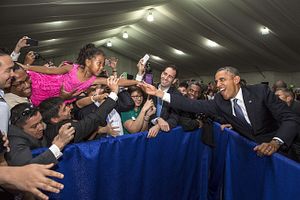The Philippines and the United States have signed a new defense agreement that would boost the presence of U.S. troops in the Philippines. But President Barack Obama, who arrived in Manila yesterday on a state visit, claims that the new accord is not meant to contain China.
After eight rounds of negotiations that took almost two years to complete, the Enhanced Defense Cooperation Agreement (EDCA) was finally signed. It will would cover “capacity building towards (Philippine military) modernization, strengthening (the Philippine military) for external defense, maritime security, and humanitarian assistance and disaster response.”
The text of the agreement has not yet been released to the public but the Philippines government has published a primer on it.
The holding of joint military exercises is already permitted under previous agreements signed by the two countries, but the EDCA would allow the “construction of facilities and infrastructure upgrades” and “storage and prepositioning of defense equipment.”
Critics contend that this is tantamount to permanent basing, which is prohibited by the 1987 Philippine Constitution. Government negotiators retort that the EDCA is guided by the framework of “full Philippine control over facilities to be used, non-exclusivity of use of the designated areas for U.S. armed forces, and prohibition of nuclear weapons.” In other words, there would be no building of a permanent U.S. military base or a reclaiming of the former U.S. military bases in Clark and Subic.
U.S. Ambassador Philip Goldberg reiterated this point when he said, “I will tell you what it will not do. It will not reopen U.S. bases.”
The Philippine government added that the Philippines will have full ownership of the facilities to be constructed by the U.S. military. Further, there will be “preference for Philippine suppliers of goods, products and service in U.S. military procurement.” According to the government primer, the U.S. will not be obliged to pay rent for the use and access of Philippine bases.
Aside from allowing the U.S. to construct military facilities in the Philippines, the EDCA would also increase the number of visiting U.S. personnel in the country. The primer stated that the number “will depend on the scale and the frequency of the activities to be approved by both Parties.”
Supporters of the agreement believe it will strengthen the military capabilities of the Philippines, which is currently embroiled in various maritime disputes with China. They see the EDCA as a concrete commitment of the U.S. to protect and defend the Philippines if tensions escalate in the West Philippine Sea (South China Sea). The Philippines and the U.S. are defense treaty partners since 1951.
But Obama doused the high expectations of many Filipinos when he failed to give a clear commitment to help the Philippines in its maritime conflict with China.
“Our goal is not to counter China; our goal is not to contain China. Our goal is to make sure that international rules and norms are respected, and that includes in the area of maritime disputes,” he said in a press conference at the Malacanang presidential palace.
“And we don’t even take a specific position on the disputes between nations,” he added. Nevertheless, he said he is supportive of the decision of the Philippines to seek international arbitration to resolve the problem peacefully.
Filipino journalists contrasted this position with the unequivocal statement of Obama a few days ago affirming the readiness of the U.S. to defend Japan’s ownership of the Senkaku Islands, which are also being claimed by China.
Another problem is the legal and political hurdles that could prevent the government from implementing the EDCA.
Senator Miriam Defensor Santiago, chair of the Committee on Foreign Relations and a member of the majority coalition, said the signing of the EDCA was an “unfair surprise” to the Senate, which was not given a copy of the agreement. She also expected activists to question the constitutionality of the pact before the Supreme Court.
Earlier, a former vice president and two other senators led a group of petitioners who questioned the haste in signing the EDCA.
“Just as we decry the lack of transparency in the crafting of the (EDCA), so do we oppose the rush to have the deal signed in time for the Obama visit. We insist that such an agreement should undergo thorough and extensive deliberations by the Senate as well as wide-ranging public discussion,” they said in a statement.
The EDCA will expire after 10 years but it can be renewed by both parties.

































